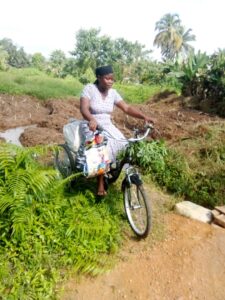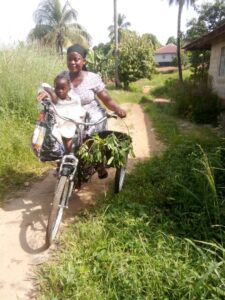 My name is Aminata Sesay, and I am a member of Slow Food Sierra Leone. I have been a subsistence organic farmer for over eight years, growing cassava, sweet potatoes, okra, rice, and traditional herbs. I strongly believe in good, clean, and fair agriculture. As a mother of three, I have faced significant challenges, especially after losing my husband to the Ebola virus five years ago.
My name is Aminata Sesay, and I am a member of Slow Food Sierra Leone. I have been a subsistence organic farmer for over eight years, growing cassava, sweet potatoes, okra, rice, and traditional herbs. I strongly believe in good, clean, and fair agriculture. As a mother of three, I have faced significant challenges, especially after losing my husband to the Ebola virus five years ago.
As the demand for food continues to grow in Sierra Leone, the agricultural sector is becoming increasingly vital for the country’s economic development. However, many smallholder farmers like me face considerable challenges, including limited access to markets, inadequate inputs and credit, and poor infrastructure and transportation systems. These issues hinder the productivity and profitability of smallholder farmers, ultimately limiting our ability to contribute to the growth of the agricultural sector.
 One promising solution to these challenges is the use of bicycles in agriculture. Bicycles are a sustainable and cost-effective alternative to traditional fuel-powered vehicles, offering numerous benefits for smallholder farmers in Sierra Leone. They facilitate transportation, reduce costs, and improve access to markets.
One promising solution to these challenges is the use of bicycles in agriculture. Bicycles are a sustainable and cost-effective alternative to traditional fuel-powered vehicles, offering numerous benefits for smallholder farmers in Sierra Leone. They facilitate transportation, reduce costs, and improve access to markets.
On July 23, 2024, I was approached by a team of Slow Food garden coordinators who asked me to share the challenges I face in my agricultural production process. I filled out a questionnaire to express my needs, identifying three key challenges: the transportation of my agricultural products to the market, the lack of seedlings, and the lack of dibbers.
Fatmata Mansary, the head of Slow Food in the Kailahun District, took my questionnaire and promised to follow up with me. On October 27, 2024, while working on my farm, I received a call from Fatmata asking me to meet her at the town wall. To my surprise, she informed me that Pedals for Progress, a United States organization, had donated a bicycle to our network, and I was one of the beneficiaries.
When Fatmata shared the news with a smile, I was overwhelmed with joy and exclaimed, “Thank you, Pedals for Progress, for this amazing gift and support!” Before this, I had been walking five miles every day to sell my produce at the market, which was incredibly challenging. Now, I had received a new tricycle from Duke Farm, outfitted with strong, clean tires.
Fatmata provided the bicycles along with lending guidelines for me and other community members through the Association. This initiative aims to create opportunities for women farmers like me to access markets, schools, and health centers.
Moreover, Fatmata and Ibrahim facilitated community sensitization meetings to educate residents on the importance of the Pedals for Progress bicycle project and to address related socio-economic issues.
The introduction of the Pedals for Progress bicycle project and the accompanying training has been timely and essential in helping our rural communities recover. It has strengthened access to work and education through the power of bicycles.
